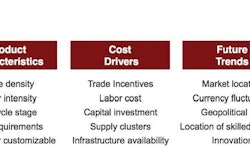Everett, Wash.—June 12, 2013—According to a recent survey conducted by Intermec Inc., transport and logistics companies around the world believe that arming their mobile workforce with new technology could cut both their pick-up times by 30 percent and delivery times by 29 percent, savings which could be crucial in boosting operational efficiency levels and meeting customer demands.
“Investing the time to review current processes may seem to be a daunting task but the benefits show this is more than worthwhile,” said Jeff Sibio, Industry Marketing Director for Transport and Logistics, Intermec Inc.
The study, which surveyed 375 managers of transport and logistics firms in six countries around the world during April 2013, finds that 38 percent of U.S. organizations view operational efficiency as the area of most strategic importance for their business. More than three quarters (77 percent) of organizations across the United Kingdom, U.S., Germany, France, Australia and New Zealand say their customers now demand same-day delivery services. Additionally, 92 percent of companies claim that meeting these expectations is placing significant challenges on their business to adjust.
Most feel that customer demand can best be made through automating key processes in the pick-up and delivery areas and adopting new technology for drivers such as GPS, mobile and broadband communications. Companies anticipate that by adopting these technologies, the time taken for each pick-up and delivery can be cut by 2.68 and 2.41 minutes respectively, providing a significant boost to the efficiency of the mobile worker. Further report findings are as follows:
- Survey respondents believe broadband mobile communications (60 percent), integrated vehicle telematics (44 percent) and RFID (38 percent) offer the most promising ROI to their organization.
- Efficiency gains from new technology could extend to back office staff as well. The survey respondents report that they are receiving 6,677 calls per day from customers asking for order status updates.
- By providing proactive shipment updates, a process enabled by location-based and mobile technologies, these same companies believe they could eliminate 24 percent of these calls immediately.
- This equates to 1,602 calls per working day, a time saving that could then be used to better serve a wider range of customers.
- About 44 percent of companies feel that process re-engineering is the most effective means of improving operational efficiency levels.
- Overall, transport and logistics managers feel that a process re-engineering effort can improve efficiency levels by over 13 percent. Yet despite this, over a third (39 percent) failed to complete a process re-engineering effort in the last year.
- Of these, nearly three quarters (72 percent) have not evaluated their existing processes for at least two years.
“Customer expectations in the industry are growing higher each day, putting increasing pressure on mobile workers to meet tighter deadlines,” said Sibio. “Our survey shows that the use of technology not only reduces call and pick up times for workers, it also offers customers the chance to make fewer calls.”
The research was commissioned by Intermec and carried out by research company Vanson Bourne in April 2013.

















